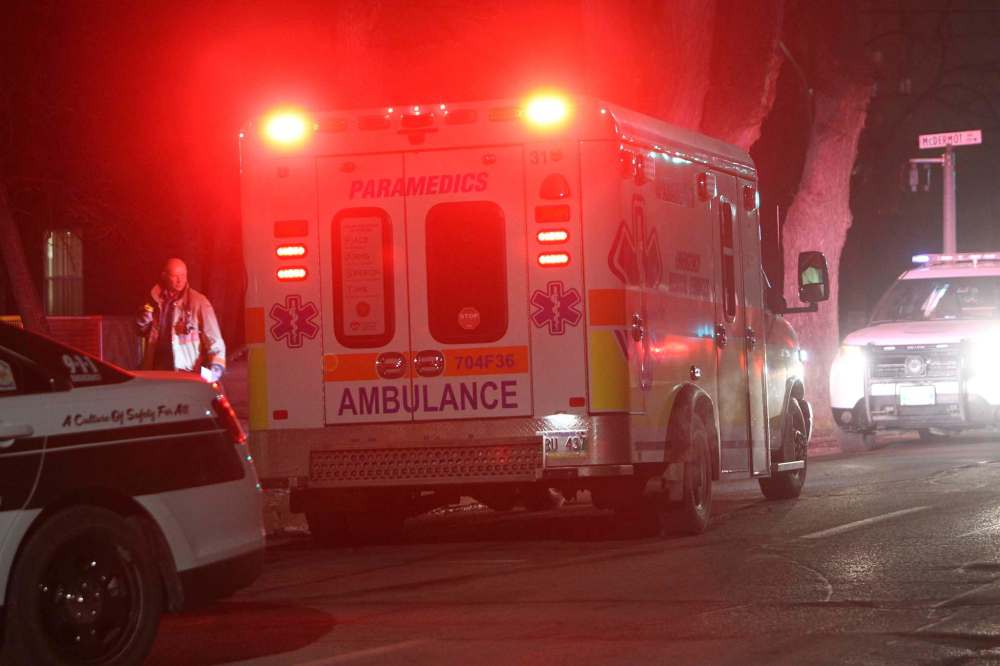City studying costs of getting out of ambulance service
Advertisement
Read this article for free:
or
Already have an account? Log in here »
To continue reading, please subscribe:
Monthly Digital Subscription
$0 for the first 4 weeks*
- Enjoy unlimited reading on winnipegfreepress.com
- Read the E-Edition, our digital replica newspaper
- Access News Break, our award-winning app
- Play interactive puzzles
*No charge for 4 weeks then price increases to the regular rate of $19.00 plus GST every four weeks. Offer available to new and qualified returning subscribers only. Cancel any time.
Monthly Digital Subscription
$4.75/week*
- Enjoy unlimited reading on winnipegfreepress.com
- Read the E-Edition, our digital replica newspaper
- Access News Break, our award-winning app
- Play interactive puzzles
*Billed as $19 plus GST every four weeks. Cancel any time.
To continue reading, please subscribe:
Add Free Press access to your Brandon Sun subscription for only an additional
$1 for the first 4 weeks*
*Your next subscription payment will increase by $1.00 and you will be charged $16.99 plus GST for four weeks. After four weeks, your payment will increase to $23.99 plus GST every four weeks.
Read unlimited articles for free today:
or
Already have an account? Log in here »
Hey there, time traveller!
This article was published 07/12/2017 (2919 days ago), so information in it may no longer be current.
Getting out of the ambulance business could create a financial funding gap for Winnipeg’s firefighting service.
Coun. Scott Gillingham, chairman of council’s finance committee, said he expects an administrative report will detail not only how the city can transfer ambulance responsibility back to the Winnipeg Regional Health Authority or another provincial agency, but also what financial impact that will create for city hall.
“The report we’re going to get back in 90 days will be a detailed plan that should include analysis of the financial impacts,” Gillingham told reporters.

The WRHA provided city hall $20.6 million for what civic officials said was baseline ambulance services in 2016, with almost half ($9.46 million) of that allocated as revenue subsidy for firefighting services for when firefighter-paramedics respond to medical calls.
The WRHA surprised city hall when it sent a letter dated Nov. 22 stating it was changing the terms of a long-standing agreement, freezing funding for ambulance services at 2016 levels. The city said that creates a budget shortfall of $2.5 million for this year, and an estimated $4.6 million in the Winnipeg Fire Paramedic Service budget for 2018.
In response, the city is insisting the WRHA make good on the funding or specify which ambulance services areas it wants cut to meet the city’s budget. In addition, the executive policy committee Wednesday unanimously approved Gillingham’s proposal to consider handing ambulance services back to the province.
Alex Forrest, president of the union that represents firefighters and firefighter-paramedics, told reporters earlier this week the loss of the ambulance contract would have no impact on firefighting services, but Gillingham said he didn’t know if that was true and is waiting for the report.
Budget information presented to a council committee earlier this week by the Winnipeg Fire Paramedic Service showed the number of fire calls have been essentially flat since 2009 (about 20,000 annually), while the number of medical calls have been steadily increasing since 2012 (80,000 in 2016).
If city hall goes through with its threat to get out of the ambulance business, it’s uncertain if the WRHA or the provincial government will want to continue providing funding to the WFPS for when its firefighter-paramedics respond to medical calls and, if it does, at what amount.
Coun. Brian Mayes also raised concerns at Thursday’s finance meeting about whether city hall will be on the hook for severance costs for the EMS paramedics still on its payroll after a turnover is completed. Mayes said city hall can’t assume the province will take over the existing collective agreement for the EMS paramedics.
Gillingham insisted the 2018 budget shortfall created by the WRHA doesn’t mean council will be asked to approve an unbalanced budget. Supported by chief financial officer Mike Ruta, Gillingham said budget revenues are based entirely on estimates and the uncertainties around the WRHA funding do not alter the validity of the budget.
“There are estimates in that (2018) budget based on permit revenue, on other government revenues,” Gillingham said, adding the outcome of the WRHA dispute will be re-evaluated later.
But Coun. Russ Wyatt said he believes Ruta and Gillingham are misleading council, adding that if the administration knows the funding is uncertain, they can’t claim it’s a balanced budget.
“If he doesn’t know that funding is going to be in place as of Dec. 31, the budget is not balanced for next year,” Wyatt said. “They don’t want to admit they have an unbalanced budget, but they do. They should just be upfront about it. You can’t say we’ll figure it out next year.”
aldo.santin@freepress.mb.ca

